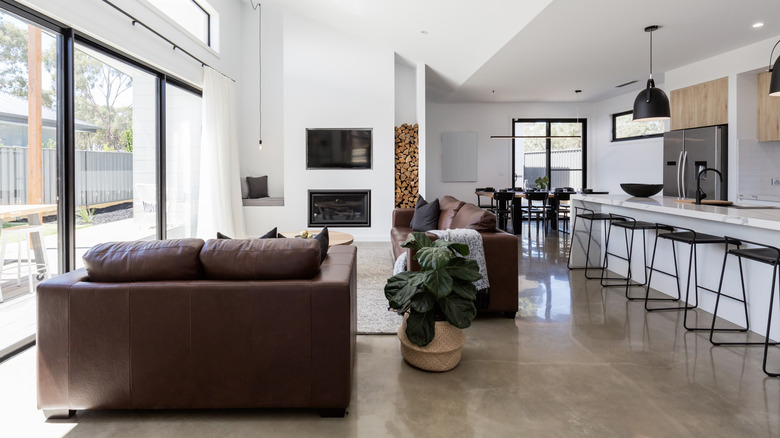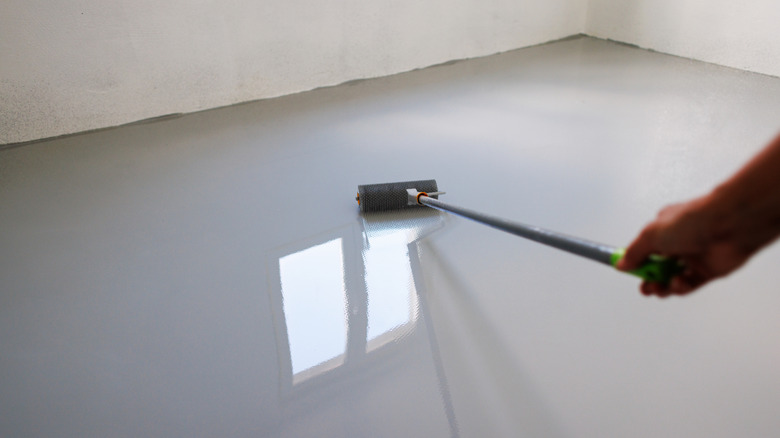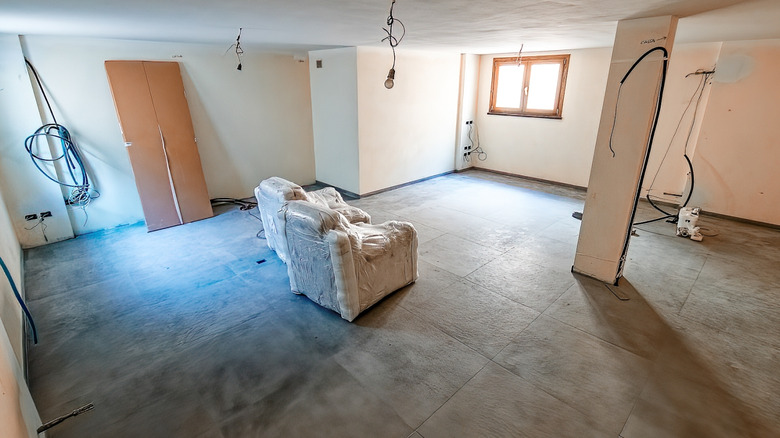Types Of Concrete Floor Finishes (& How To Choose The Best One)
Concrete flooring is affordable and surprisingly versatile, even allowing you to customize it in many ways with DIY techniques. Although installing it in your bathroom could be a big mistake, the ability to add color and texture means it doesn't have to be limited to just the basement and garage. If you've looked into whether concrete is right for your space and decided to go ahead, you'll also want to investigate the different types of concrete floor finishes available and how to choose which one is best.
The options can run from relatively quick and easy to extremely time-consuming, while others require a high degree of experience and skill. Obviously, whether you can DIY the job or need to call in a professional will have a big impact on cost. So, let's do a quick run-through and then discuss their application in more detail.
Painting is a straightforward, budget-friendly option. If you're okay with gray and just want to make the floor easy to clean, sealing is also very affordable. Staining is an alternative that can produce attractive results, and polishing (or burnishing) can add a glossy sheen. Epoxy produces a particularly hard-wearing surface that is popular in garages. Faux grout lines can add interest, and it's possible to achieve faux wood effects or faux marble. Stamping or stenciling can be appealing, and finally, there's microtopping (also called microscreed or microcement).
Best concrete floor finishes for speed and ease
A few handy tools make painting concrete floors a breeze. Water-based latex paints are available, though color choice is limited. Polyurethanes, like Rust Bullet DuraGrade Concrete Paint, offer greater variety. The downside is that painted concrete is prone to scuffs and scratches. Sealer is also easy to apply with a brush, roller, or spray, although an etch coat may be required first to make sure it bonds.
Concrete stain comes in two forms: acid- or water-based. Acid reacts with the concrete to produce a mottled effect that can look fabulous but is hard to control. Water-based stains give a more consistent finish, and there's a greater color choice. If you want a high shine, it's possible to polish concrete DIY style, but it will remove some of the surface, so it's only appropriate for finishes that penetrate, like stain.
Using epoxy on concrete floors produces a particularly durable finish. While it is a favorite for garages, Rust-Oleum's Epoxyshield can have decorative chips added, so you might want to use it indoors. It's a 2-part water-based product, so correct mixing is important, but it is another concrete floor finish designed for DIY application.
Concrete finishes that take a little more time and skill
A faux marble effect can be achieved with metallic epoxies, although it's generally recommended they be applied by professionals. Stamping and faux wood finishes normally need to be done with wet concrete since they impact the surface texture. There is a DIY hack if you have concrete floors but prefer the look of wood, although it is very labor-intensive. Etching faux grout lines to give the appearance of a tiled floor can also be effective but takes time and patience. Stencils can either be pressed into wet concrete (much like stamps but with less indentation) or be used like a traditional stencil with paint or water-based stain. However, if the concrete is too coarse, know that it will cause blurring at the edges.
Lastly, there's microtopping. A thin layer of cement and polymer is used to create a seamless surface that is smooth and very durable. Numerous shades can be intermixed to create custom colors. However, it is hand-troweled and must be applied by a contractor.
So, if those are the types of concrete floor finishes currently available, how do you choose which is best? A lot depends on your budget and the desired appearance, so it's very much a personal choice. Investigate the properties of each product before you decide to ensure it is a good fit for your floors. You'll also want to consider the best way to clean concrete floors, as each finish tends to have its own demands.


